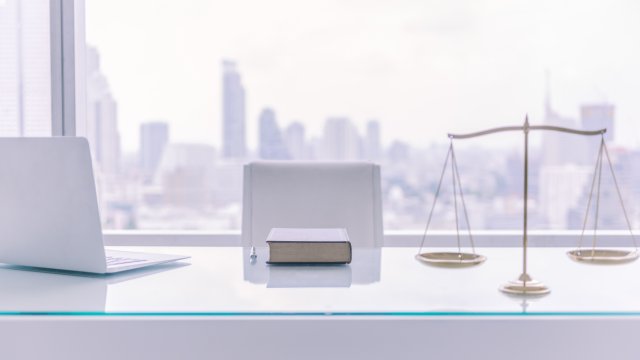As artificial intelligence continues to transform everyday lives, there's a new race underway to harness the power of A.I. in the courtroom.
At the cutting edge of that movement is Joshua Browder, the CEO of a start-up called DoNotPay.
Browder says he's on a mission to create the world's first A.I.-powered attorney.
"The legal industry is David versus Goliath," Browder said. "Unfortunately, it's pay to play. So the people with the most money typically win in court cases, but software can level the playing field."
A DoNotPay Instagram ad says the company "made a product that catches illegal spam callers and gets them to pay you."
At a fraction of the cost of a human lawyer, Browder says he is able to use his software to help everyday Americans battle legal issues, such as traffic tickets and evictions.
So far, he says his company has helped in more than 1.5 million cases and saved his clients millions of dollars.
To show how his technology works to Scripps News, Browder entered a hypothetical case on his DoNotPay website of a client who was looking for an attorney to help them get reimbursed for a canceled flight.
"We're going to sue a company at the press of a button," Browder said. "I'm going to send them a demand letter for $800. The robot wants to gather as much evidence to make your case as strong as possible, so ask things like dates or photographs."
The details of the incident filter through Browder's algorithm. Then the user waits about 30 seconds for it to generate a legal demand letter.
"So just like that, it mentions all of the laws of the local state," Browder said.
The system then automatically sends the letter to the recipient, and the client awaits a response.
SEE MORE: WHO says using AI in health care carries a multitude of risks
For now, DoNotPay can generate legal letters, lawsuits and other routine court documents. But for the past year, Browder had been planning to take the technology one step further: using A.I. to represent a client in the courtroom for the first time in history.
"They're going to put on airpods, and the A.I. will be whispering in their ear," he said. "It will listen to the court hearing process, hear what's going on, and then will whisper very quickly back what to say."
The plan sparked backlash from lawyers across the country, including a class-action complaint in San Francisco that argued "DoNotPay is not actually a robot, a lawyer, nor a law firm. DoNotPay does not have a law degree, is not barred in any jurisdiction, and is not supervised by any lawyer."
Because of that, the complaint contends, it's illegal to use in a courtroom.
Browder says that opposition has forced him to postpone his plans for now.
"I think lawyers are very scared ... A.I. will replace a lot of lawyers," he said. "We're on the side of the people, not the lawyers, and the people need legal help for free or very cheaply."
Georgetown law school professor Tanina Rostain told Scripps News access to legal help is a problem faced by millions of Americans nationwide.
"92% of people living in the United States either get no legal help or inadequate legal help with their legal problems. It's an incredible crisis," she said.
Rostain researches ways technology can be used to change that. She said A.I. can help solve the crisis but says it should never be allowed to completely replace a lawyer.
"We need lawyers to be the subject matter experts," Rostain said. "Technology is helpful, but I think having human beings who are helpful, who use technology, is really the best approach."
Though Rostain agreed that having an A.I. lawyer would be better than not having one at all, she said there's one caveat.
"We do need quality control," she said. "We need to test it. We need to try it. We need to see what type of errors it makes."
A big question remaining is: Who would be held accountable if an A.I. made a mistake that could qualify as malpractice?
"That's why we have to think about how do we regulate it so that if it makes a mistake, clients would get their money back or get some form of redress," Rostain said.
SEE MORE: The entertainment industry is pushing to protect itself from AI
Rostain says A.I. can get information wrong, make up facts to try to win a case and even reflect the bias of the people who created it.
"People tend to rely a lot on technology and just assume that whatever it says is true," she said.
Without any oversight, Rostain worries that A.I. legal tech could be driven by profit, not the interests of clients.
DoNotPay's own terms of service state: "Any communications between you and DoNotPay may not be protected under the attorney-client privilege doctrine" and that it can share data with third party companies.
Rostain says that practice could be especially harmful to legal clients, who are already vulnerable and could be targeted by predatory companies.
"You don't want their data to be used for other purposes," she said. "You don't want the data to be exploited."
Browder told Scripps News his focus for now is on improving A.I.'s capacity so it can be a more reliable resource for people who need legal help.
"The biggest challenge we've had is that A.I. makes things up, so we've had to tell the A.I. stick to the facts," he said. "A.I. is really good at doing lots of things, but … you have to train it."
Even with those challenges, studies say that over the next decade thousands of legal roles will be fully automated, as A.I.-powered technology reshapes the legal world.
Trending stories at Scrippsnews.com




